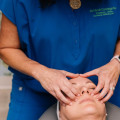Athletes constantly push their bodies to the limit—training intensely, competing regularly, and striving for peak performance. But with this dedication comes physical stress, fatigue, and an increased risk of injury. To maintain optimal health and sustain long-term performance, recovery becomes just as important as training itself. Massage therapy has emerged as one of the most effective methods for helping athletes recover faster, reduce muscle tension, and improve overall performance. Far from being a luxury, it’s now considered an essential part of athletic conditioning and care.
Promoting Muscle Recovery and Reducing Fatigue
During intense workouts or competitions, microscopic tears occur in muscle fibers. While this is a natural part of building strength, it also causes soreness, inflammation, and stiffness. Massage therapy enhances recovery by increasing blood circulation, which delivers oxygen and nutrients to damaged tissues and removes metabolic waste such as lactic acid. Techniques like deep tissue massage and sports massage specifically target tight areas, accelerating healing and reducing post-exercise discomfort. As a result, athletes can recover more quickly between sessions and maintain consistent training schedules without overstraining their bodies.
Improving Flexibility and Range of Motion
Flexibility plays a key role in athletic performance, helping to prevent injuries and enhance mobility. Regular massage therapy loosens tight muscles, improves joint flexibility, and lengthens connective tissues. By breaking down adhesions and scar tissue that develop from repetitive motion or old injuries, massage restores natural movement patterns. Athletes who incorporate massage into their routine often experience greater agility and smoother muscle function—both crucial for peak performance.
Preventing Injuries Before They Happen
Injury prevention is one of the most valuable benefits of massage therapy. Through consistent sessions, therapists can identify areas of tension, imbalance, or weakness that might lead to future problems. By addressing these issues early, massage helps athletes avoid strains, sprains, and overuse injuries that can sideline their progress. Pre-event massages are especially effective for warming up muscles, improving circulation, and preparing the body for intense activity, while post-event treatments help with cooling down and minimizing soreness.
Enhancing Mental Focus and Reducing Stress
Athletic performance isn’t just physical—it’s mental. The pressure to perform can lead to stress, anxiety, and mental fatigue. Massage therapy provides a powerful psychological benefit by promoting relaxation and reducing cortisol levels, the body’s primary stress hormone. The calming effects of touch and rhythmic movement help athletes clear their minds, improve concentration, and restore emotional balance. This mental clarity translates directly into better focus during competition and more motivation during training.
Supporting Long-Term Athletic Health
Consistent massage therapy offers cumulative benefits for athletes over time. It supports tissue health, aids in injury rehabilitation, and contributes to overall body awareness. Regular treatments also help athletes listen to their bodies more closely—recognizing the difference between normal soreness and potential injury. While self-care methods like stretching and foam rolling are helpful, getting professional help from a licensed massage therapist ensures that treatment is tailored to specific needs, techniques are applied safely, and recovery goals are effectively met.
Integrating Massage into an Athlete’s Routine
For best results, massage therapy should be part of a comprehensive wellness plan. Frequency and intensity depend on factors such as training volume, sport type, and recovery goals. Many athletes schedule sessions weekly or biweekly, combining them with proper hydration, nutrition, and rest to maximize performance benefits.
Final Thoughts
Massage therapy is more than just a recovery tool—it’s a cornerstone of athletic health and longevity. By improving circulation, flexibility, and mental focus, massage helps athletes perform at their best while reducing the risk of injury. Whether you’re a professional competitor or a weekend warrior, incorporating massage therapy into your regimen is an investment in both your short-term recovery and long-term success.











